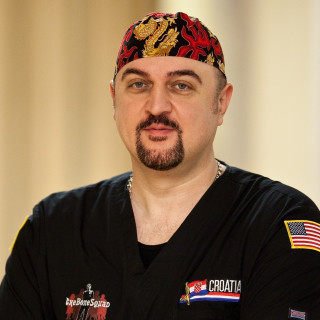
Most Chicagoans know me as an Orthopedic surgeon specializing in trauma, spine & joint replacement, but you may not know I’m also an orthopedic patient.
After sustaining an injury to the anterior cruciate ligament in my knee at the age of eighteen during an All-Star game in basketball, my athletic career ended for good. Thirteen knee surgeries later, I’m definitely a candidate for a knee replacement. However, as I preach to my patients, maintaining optimal weight can go a long way towards delaying the inevitability of having to undergo surgery to obtain a new, artificial joint.
The biggest problem with an arthritic joint is that walking and exercise remains challenging. In my practice, I have been diligently focusing on helping my patients improve their nutrition so that they can lose and maintain optimal weight even without exercise, since their mobility is often limited. We have had some amazing patient outcomes, but I felt that in order for me to have “street cred” I had to walk the walk (or in my case, limp the limp) and take control of my own eating habits.
During my athletic heyday, I was 6’11” and 250 pounds. Over the past couple of years, I’ve been tipping the scales at a hefty (or should I say obese) 320 pounds. So since the New Year, my wife, Dr. Karla Ivankovich, and I have changed the way we eat. Our new diet primarily consists of increased intake of lean proteins while at the same time minimizing gluten. It’s working! Although I have fifteen more pounds to lose before I hit my target, to date I have lost thirty pounds and my knee is feeling much better.
With this new regimen, I eat six small meals per day and never feel hungry. The interesting thing is that I have managed to lose the weight with very limited exercise. Besides adding free weights and core strengthening (planks and sit-ups on a Swiss Ball) 10–20 minutes daily, I also try to walk as much as my knee can tolerate (about 5,000–7,500 steps daily). I found that this is doable despite my schedule.
Small changes to our habits add up to major results over time. My wife and I have found these changes painless to practice and this particular way of eating to be sustainable over time. We believe this simple regimen will now become a permanent way of life for us.
We in the medical profession have bought into faulty studies and have given much misguided advice to our patients over the decades. We demonized perfect foods, such as eggs; advised limiting healthy fats; and encouraged increased carbohydrate intake. In the interim, the weight of the general population has soared. Each week, it seems a new study comes out with contradictory evidence confusing people to the point that they don’t really know what constitutes healthy eating any more.
The worst part of this scenario is that we as physicians have not been given adequate training in nutrition. We advise our patients to lose weight and exercise, but we rarely give them an accurate road map to achieving their goals. Many of us subscribe to the old theory of calories in and calories out, but that is not the way that human bodies actually work. Moreover, we simply do not follow this advice ourselves. We have grueling schedules, grabbing hospital meals or junk food on the run. Of course, as you may have noticed, carbohydrate and sugar heavy diets leave one depleted of nutrients and feeling run down. The more we eat that way, the worse we feel, and the sicker we become.
I’ve found that cutting down on starches and gluten, increasing lean protein, such as chicken, bison, and grass fed beef, adding heart healthy fats such as olive oil and avocado, and not eating sugary treats or consuming soft drinks can yield enormous changes, both externally and internally. It is true that I have lost weight and eased the pressure on my joints, but I have also improved my overall health.
Over 2,000 years ago, Hippocrates, the father of medicine, said, ‘Let food be thy medicine, and medicine be thy food.’ Moving forward, what does that mean for us as practitioners? I am hopeful that while medicine will make technological advances in the new millennium, it will come full circle and we will take a holistic approach to treating patients. This will include treating not only injured or sick body parts but the patient as a whole. And that means we will have to acknowledge that food is a critical component in maintaining good health.
During my personal health initiative, I’ve discovered one of the most important factors in making healthy changes is to avoid junk food and think whole and natural. Moreover, it is not difficult or expensive to do. I advise my low-income patients to shop at Aldi, ethnic markets, or to catch the early morning bargains at Jewel where they will find great prices on wholesome, natural, and organic foods. A bit of meal planning prior to going to the grocery store ensures a good shopping experience that will yield flavorful meals all week.
It is understood that each individual is different and will have to tweak their nutritional preferences until she or he optimizes it for his perfect outcome. Food sensitivities, allergies, or intolerances can affect the results, so we must council our patients to eliminate certain high allergy foods during the initial phases of the diet, adding them back in so that they may ascertain what suits them best. Some may do better on a diet of fish, others on red meat. Some might not be able to tolerate fats and get sleepy after eating, while others will thrive on a ketogenic diet. Regardless, we must inspire our patients to take control of their lives and be proactive about their health if we are to be true healers.
I felt compelled to show my patients the way by example. Now, I think my patients and I will be even more connected because I practice what I preach.

Dr. Ivankovich is an orthopedic surgeon in Chicago, IL and a 2017–2018 Doximity Fellow.







